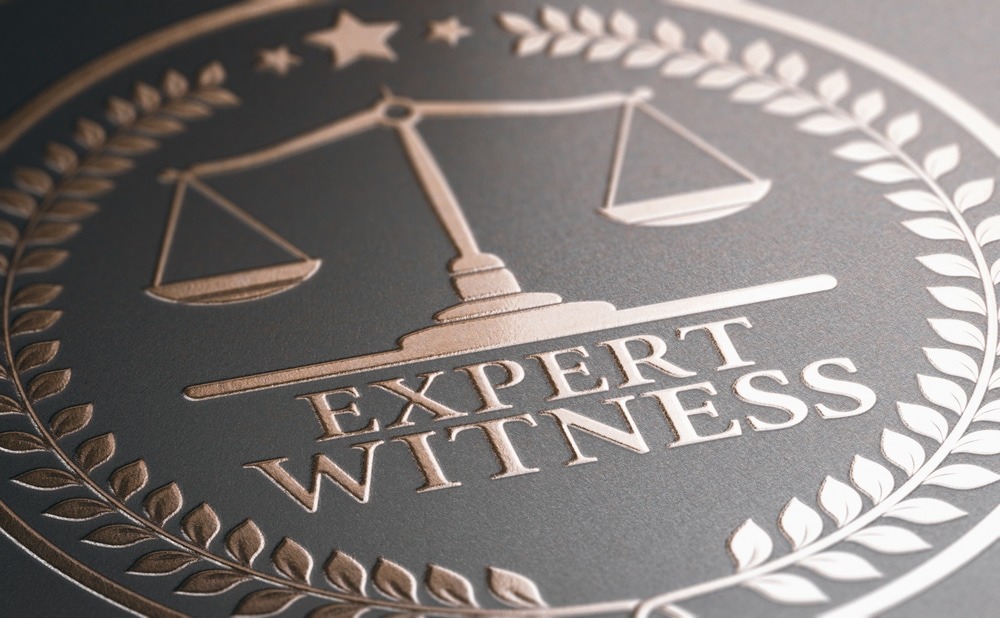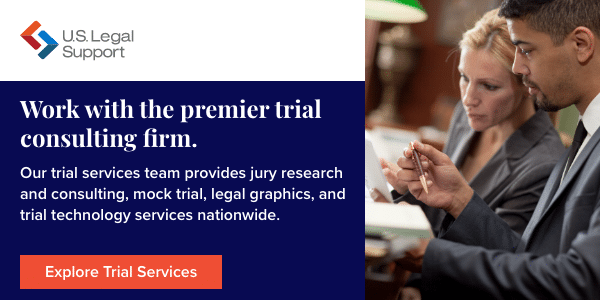Fact Witness vs. Expert Witness: Key Preparation Tactics

As it pertains to building a solid case, persuading jurors, and securing the best chances of a favorable outcome, witnesses can make or break your trial. It’s essential to utilize key witnesses to their full potential during your arguments—but, unlike lawyers and other legal representatives, they’re generally not used to courtroom interrogations.
Preparing your witnesses to testify is key to success on the stand. But, when it comes to readying a fact witness vs. an expert witness, you’ll need to employ different strategies to make sure they deliver a convincing, moving testimony.
Fact witnesses need to deliver their best version of the case’s events, while expert witnesses have to be brought up to speed to give their outside opinion on its proceedings. Here, we’ll break down the roles of these different witnesses and offer some actionable strategies for ensuring optimal testimony during your trial.
Role of a Fact Witness
Fact witnesses are the most common type of witness called to the stand during trials. In legal proceedings, a fact witness provides firsthand accounts of events. They generally have a personal connection to the case and can provide insight into1:
- The events or incident the lawsuit is based on
- The background and character of the people involved
Lawyers may call a fact witness to the stand for a variety of reasons. Perhaps they observed the incident being discussed and can provide detailed clarity. Other times, fact witnesses may comment on a person’s demeanor and characteristics to shed light on patterns of behavior.
Whatever the reason they’re called to the stand, the point of utilizing a fact witness is to convince the jury of your case via insider knowledge about the situation.
Role of an Expert Witness
Expert witnesses offer a different perspective of a case than fact witnesses. Unlike the latter, they didn’t see the event or know the people involved personally. Instead, they possess advanced expertise in the topic at hand and offer professional, unbiased advice about the evidence presented to them. They play a vital role by providing expert testimony of complex information which is typically beyond the jury’s personal knowledge.
Definition and Function
An expert witness can be from any field pertaining to your case. They’re individuals with advanced knowledge of a topic that members of the general public don’t fully know or understand. Usually, they prove their expertise in their area through2:
- Education
- Training
- Licensing
- Board certification
Expert witnesses are called in to provide clarity on complex subjects. Since juries are composed of laymen, they may not understand the intricacies of medical diagnoses, legal precedents, and other complicated topics. Expert witnesses give them straight facts about their field and explain how the case’s events may have unfolded via their assessment of the situation. However, make sure you know how to qualify an expert witness before putting them on the stand.
Types of Expert Witnesses
There are a variety of different types of expert witnesses you may call to the stand to defend your claims. Nine of the most common kinds include3:
- Educating witnesses – These knowledgeable professionals educate fact-finders about the scientific theory underlying the events of a case.
- Vocational experts – Vocational experts assess when people can return to work, what jobs they may be suited for, and any skills they may need to learn to rejoin the labor force.
- Reporting witnesses – This is generally the laboratory technician who conducts any sort of tests related to the case.
- Engineering experts – Engineering experts examine products and materials to determine if they’re up to safety standards and if the manufacturer may be liable for their malfunction.
- Non-testifying experts – These aren’t actually witnesses, per se, but instead aid attorneys while they’re analyzing other expert witnesses.
- Financial experts – With their knowledge of tax, banking, and property laws, financial experts offer insight into complex monetary disputes.
- Securities experts – During cases of white-collar crime, security experts examine potential market manipulation and illegal activity by financial institutions.
- Forensics experts – From assessing an inebriated driver’s intoxication level to giving their professional opinions on arson cases, forensic experts analyze crime to break it down for layman’s understanding.
Key Preparation Tactics for Fact Witnesses
Expert witnesses may have some courtroom experience if they’ve been hired to testify in other cases. Fact witnesses, however, are generally fresh to the legal process and may be nervous, anxious, or scared to testify. To overcome these issues and best prepare them for the stand, focus on:
Gathering and Reviewing Facts
Our memories aren’t perfect, particularly during tense or traumatic experiences. In fact, it’s not uncommon for witnesses to experience dissociative amnesia—the unconscious blocking of negative memories to maintain one’s mental health.4
Regardless of whether or not your witness recalls the event’s details clearly, it’s solid practice to refresh their memory by going over the facts and evidence of the case. So, before the trial begins, review:
- Any physical evidence
- Statements, videos, or photos of the event
- Documentation, such as police or medical reports, pertaining to the case
Once you have all the facts down pat, you can begin preparing your line of questioning and associated testimony.
Preparing Testimony
Delivering testimony isn’t only about laying out the facts and letting the jury decide on the case. It’s likewise about being convincing, building sympathy, and having the jurors understand the event through the witness’s eyes.
Before your witness even sets foot in the courtroom, it’s essential to repeatedly practice the words, tone, and delivery they’ll use during the trial. That doesn’t mean leading your client to specific answers, but instead helping them deliver succinct, useful, and relevant testimony in their own words. To establish the kind of dialogue you’ll display in court:
- Lay out what you plan to ask them during direct examination
- Explain the key details you’ll need them to mention during testimony
- Show them the exhibits and order they’ll be presented during the trial
Anticipating Cross-Examination
The opposing counsel will get the opportunity to test and examine your witness —and they’ll be looking for inconsistencies, exaggerations, or anything else they can use to derail your case. Opposing counsel may seek to challenge your fact witness’s testimony by exposing potential biases and inconsistencies in their statements.
To best prepare for this difficult line of questioning, try to anticipate exactly what the other side’s representation may ask your client. Think about the case from their perspective and try to identify:
- Any weak points in your testimony that may not be supported by the available evidence
- How your witness may be manipulated into misspeaking or doubling back
- Truthful, unequivocal answers to their potential questions
Key Preparation Tactics for Expert Witnesses
While some expert witnesses may have prior experience testifying in court, they’re more so professionals in their fields than on the stand. Like fact witnesses, they’ll need to be informed about the ins and outs of courtroom proceedings, so focus your efforts on:
Reviewing Case Materials
Expert witnesses have years of experience in their profession but are completely fresh to the particular trial at hand. They’ll need to be filled in on essentially every detail and fact of the case, so provide them with the same materials as fact witnesses, including:
- The available evidence
- Witness statements, police findings, and other official reports about the case
- Any other related documentation
If possible, have your expert witness meet and interview anyone who can provide more insight into the case’s events. Fact witnesses, police, and other related parties can all provide clarification to expedite their analysis.
Preparing Expert Reports
When preparing for any trial involving an expert witness, it’s necessary to have them compile a report of their findings on the case. It should include5:
- The witness’s professional opinion about the events of the case
- The evidence, facts, or data they considered to come to their conclusion
- Their qualifications, including a list of their published works over the previous decade (if applicable)
- A list of all other cases they’ve testified at over the previous four years
- A statement outlining the expert’s compensation for working on the case
Make sure this report is bulletproof. If the opposing defense has any reason to call the expert’s credentials, findings, or opinions into question, they will. Experts can even be disqualified from testifying if the judge presiding over the case finds their report to be vague or misleading. For each claim your witness makes in their report, ensure there’s corresponding evidence to back it up.
Conducting Mock Examinations
Just like the opposing counsel has the power to cross-examine your fact witnesses, so too can they question your expert witnesses. The other side will likely be even more interrogative with an expert witness, so run through some likely objections before the deposition and ensure your expert6:
- Knows their field like the back of their hand
- Does all the necessary research for the case
- Is enthusiastic about their opinion without coming off as biased for your side
- Delivers their testimony in their own words
To ensure they check all these boxes, conduct a mock examination before the court date with your expert witness. Act as the opposing counsel and try to pick holes in their testimony. A well-prepared expert should be ready to defend against any attacks on their opinions and credentials.
Differences in Preparation for Fact vs. Expert Witnesses
While fact witnesses require more assistance with the strategy and contents of their statements, expert witnesses need more information about the case’s details. Neither should be led to specific testimony, but each should be prepared to deliver relevant, useful details in accordance with their line of questioning.
The expert report is another way witness preparation differs. This report is necessary for any expert witness and they can be denied their right to testify if it’s not thorough and complete. Alternatively, fact witnesses are generally only disqualified when they’re incapable of expressing themselves or understanding their duty to provide truthful testimony.7
Prepare Your Witnesses to Deliver Clear, Compelling Testimony with U.S. Legal Support
Fact witnesses speak to the events or characters of the people involved in a case, while expert witnesses deliver their informed opinion on its events. When it comes to preparing a fact witness vs. expert witness, both should give relevant, clear testimony when on the stand.
Give your witnesses and your case the best odds of success with litigation support services from U.S. Legal Support. Through our trial services division, TrialQuest, we offer myriad trial services that can bolster your counseling and elevate your chances in court—including effective witness preparation that helps you strategize, refine, and enhance your client’s testimony.
Sources:
- Louisiana State University. Fact Witnesses. https://biotech.law.lsu.edu/.
- United States Department of Justice. EXPERT WITNESS. https://www.ojp.gov/.
- Financial Crime Academy. Types of Expert Witnesses. https://financialcrimeacademy.org/.
- Cleveland Clinic. Dissociative Amnesia. https://my.clevelandclinic.org/.
- Cornell Law School. expert witness reports. https://www.law.cornell.edu/.
- National Institute of Justice. Tips for the Expert Witness in Direct and Cross-Examination. https://nij.ojp.gov/.
- North Carolina Prosecutors’ Resource Online. 705.1Competency of Witnesses [Rule 601]. https://ncpro.sog.unc.edu/

Editoral Policy
Content published on the U.S. Legal Support blog is reviewed by professionals in the legal and litigation support services field to help ensure accurate information. The information provided in this blog is for informational purposes only and should not be construed as legal advice for attorneys or clients.


